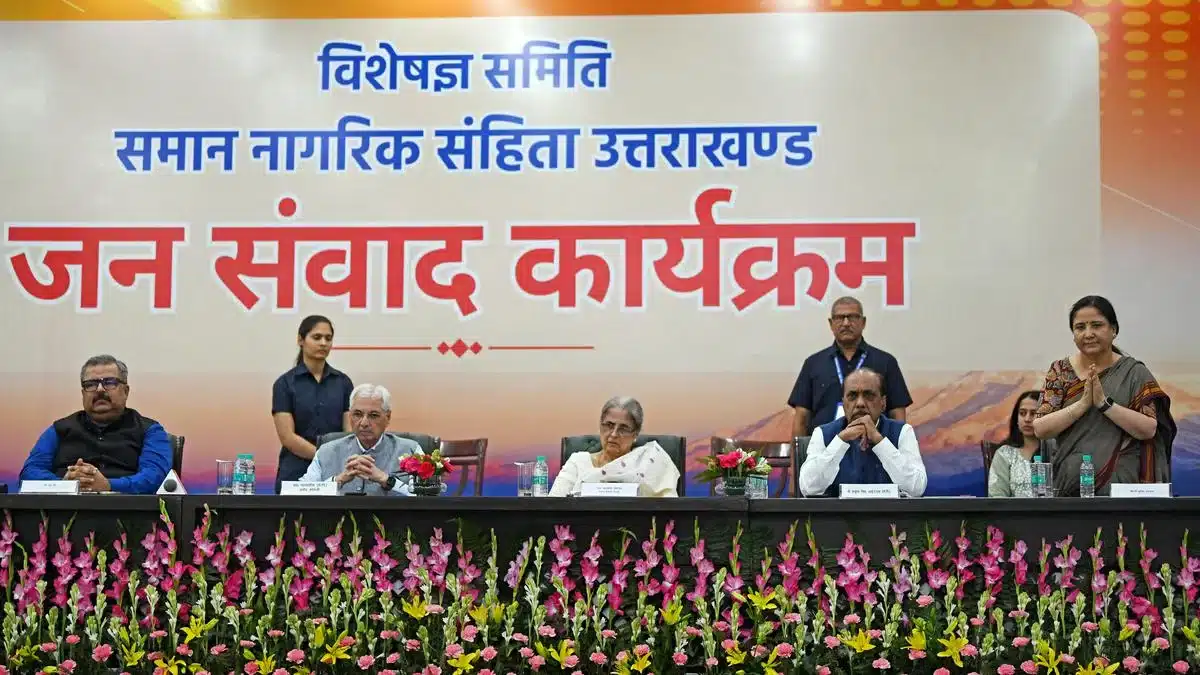Why in the News?
- The Uttarakhand Assembly is likely to pass the State’s Uniform Civil Code (UCC) Bill during its four-day-long session in February.
About Uniform Civil Code (UCC)
- A Uniform Civil Code refers to a single law for the entire country, applicable to all religious communities in their personal matters such as marriage, divorce, inheritance, adoption etc.
- It is intended to replace the system of fragmented personal laws, which currently govern interpersonal relationships and related matters within different religious communities.
Constitution of India on UCC
- Article 44 of the Constitution lays down that the State shall endeavour to secure a Uniform Civil Code for the citizens throughout the territory of India.
- Article 44 is one of the Directive Principles mentioned in Part-IV of the Constitution.
- These, as defined in Article 37, are not justiciable (not enforceable by any court) but the principles laid down therein are fundamental in governance.
- These principles consists of all the ideals which the State should follow and keep in mind while formulating policies and enacting laws for the country.
Present Status of Personal Laws in India
- Personal law subjects such as marriage, divorce, inheritance come under the Concurrent list of the Constitution.
- Both, the Parliament and state legislature can make laws with respect to any of the matters enumerated in the Concurrent List.
- The Hindu personal laws have been codified into four parts by the Parliament in 1956:
- The Hindu Marriage Act, 1955
- The Hindu Succession Act, 1956
- The Hindu Minority and Guardianship Act, 1956
- The Hindu Adoption and Maintenance Act, 1956
- The term ‘Hindu’ also includes Sikhs, Jains and Buddhists for the purpose of these laws.
- Muslim personals laws are not codified per se, and are based on their religious texts, though certain aspects of these are expressly recognised in acts such as the Shariat Application Act, 1937 and Dissolution of Muslim Marriages Act, 1939 and Muslim Women (Protection of Rights on Marriage) Act, 2019.
- Christians, Zoroastrians and Jews are also governed by their own personal laws.
Exception of Goa
- Goa is, at present, the only state in India with a uniform civil code.
- The Portuguese Civil Code of 1867, which continues to be implemented after India annexed the territory in 1961, applies to all Goans, irrespective of their religious or ethnic community.
Need for a Uniform Civil Code in India
- A Uniform Civil Code would provide equal status to all citizens irrespective of the community they belong to.
- Personal laws of different religions are widely divergent and there is no consistency in how issues like marriage, succession and adoption are treated for people belonging to different communities, which is contradictory to Article 14 of the Constitution, which guarantees Equality before the Law.
- Personal laws, because they derive from tradition and custom, also tend to give undue advantage to men.
- This becomes evident in examples such as Muslim men being allowed to marry multiple wives, but women being forbidden from having multiple husbands.
- Men (fathers) are also treated as ‘natural guardians’ and are given preference under the Hindu Minority and Guardianship Act.
- A UCC could lead to consistency and gender equality in India.
Criticism of Uniform Civil Code
- Although it reinforces equality before the law, the idea of a UCC clashes with the Right to Freedom of Religion, provided under Article 25 of the Constitution.
- Separate personal laws are one of the ways in which people have exercised their right to practise their own religion, which has been particularly important for minorities.
- The UCC could become a tool to erode this right, suppress minorities and homogenise culture.
Way Forward
- A progressive and broadminded outlook should be encouraged among the people to understand the spirit of the UCC. For this, education, awareness and sensitisation programmes must be taken up.
- Meanwhile, discriminatory personal laws should be amended/abolished accordingly.
- The Law Commission in its report titled “Reform of Family Law” (2018) had suggested that the best way forward would be to preserve the diversity of personal laws while ensuring that they do not contradict fundamental rights.
- The report suggested that by codifying different personal laws, one can arrive at certain universal principles that prioritize equity rather than blanket imposition of a Uniform Civil Code.
News Summary
- In May 2022, the Uttarakhand government announced the constitution of a five-member committee led by former Supreme Court judge Justice Ranjana Prakash Desai to draft the Uniform Civil Code.
- The committee received over 2.15 lakh suggestions from the public and held over 38 public meetings across the state over the course of preparing the draft.
- Recently, the panel submitted its final report on the UCC.
- The Uttarakhand Legislative Assembly is now likely to pass the Uniform Civil Code Bill in the upcoming assembly session.
- The draft will be discussed in a meeting of the State Cabinet before it is tabled in the form of a Bill in the Assembly.
What Provisions Can be Expected in Uttarakhand’s Uniform Civil Code?
- The draft UCC is set to focus on gender equality by introducing provisions that treat men and women equally, especially in matters pertaining to inheritance.
- Catering to demands from Muslim women in the State, it will also revoke practices governing marriage and divorce such as polygamy, iddat (mandatory period of waiting to be observed by women following the dissolution of a Muslim marriage) and triple talaq.
- The Code is also likely to extend an equal property share to Muslim women against the existing 25% share accorded under Muslim personal laws.
- Other issues such as divorce, marriage registrations, adoption, and social security for ageing parents will also be covered under the law.
Q1. Are Directive Principles of State Policy enforceable by law?
Unlike Fundamental Rights, the Directive Principles of State Policy (DPSP) are non-justiciable which means they are not enforceable by the courts for their violation.
Q2. What do you mean by Hindu Code Bills?
The Hindu code bills were several laws passed in the 1950s that aimed to codify and reform Hindu personal law in India, abolishing religious law in favour of a common law code.
Source: Uttarakhand’s Uniform Civil Code: What it means and what lies ahead? | Explained
Last updated on February, 2026
→ UPSC Notification 2026 is now out on the official website at upsconline.nic.in.
→ UPSC IFoS Notification 2026 is now out on the official website at upsconline.nic.in.
→ UPSC Calendar 2026 has been released.
→ Check out the latest UPSC Syllabus 2026 here.
→ Join Vajiram & Ravi’s Interview Guidance Programme for expert help to crack your final UPSC stage.
→ UPSC Mains Result 2025 is now out.
→ UPSC Prelims 2026 will be conducted on 24th May, 2026 & UPSC Mains 2026 will be conducted on 21st August 2026.
→ The UPSC Selection Process is of 3 stages-Prelims, Mains and Interview.
→ Prepare effectively with Vajiram & Ravi’s UPSC Prelims Test Series 2026 featuring full-length mock tests, detailed solutions, and performance analysis.
→ Enroll in Vajiram & Ravi’s UPSC Mains Test Series 2026 for structured answer writing practice, expert evaluation, and exam-oriented feedback.
→ Join Vajiram & Ravi’s Best UPSC Mentorship Program for personalized guidance, strategy planning, and one-to-one support from experienced mentors.
→ UPSC Result 2024 is released with latest UPSC Marksheet 2024. Check Now!
→ UPSC Toppers List 2024 is released now. Shakti Dubey is UPSC AIR 1 2024 Topper.
→ Also check Best UPSC Coaching in India






















